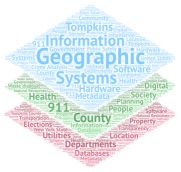
What is GIS?
3 Questions 3 Answers by Nathan Tarter former TC Web Developer.
Three questions immediately came to mind when I first heard of this thing called GIS: What does it stand for? What does that mean?, What does it do for me?
I began searching for answers and found a multitude of web resources. The more helpful ones are listed in our GIS link section so if you want more detailed info after this little scratch on the surface, surf around for a while.
Now, down to business:
Q: What does GIS stand for?
A: Geographic Information System.
That was easy enough. On to harder questions…
Q: What does it mean?
A: First, GIS is a System. It draws on many sources for input and affects many different parts of society. The system can support natural resource officials, planning departments, transportation, waste disposal, county politics, law enforcement, and private residents to name a few.
Digital Information, housed in a computer database, makes the system work. That’s called Data. In Tompkins County, the United States Government provides some data, county departments provide the majority of it, and some old-fashioned personal investigation fills in any missing pieces.
Finally, the bits of information all take the shape of lines, text, points, or fields that relate to specific Geographic locations on the earth.
The System is based on information, and the information is geographically located. That obviously means mapping the landscape is part of GIS, but it is not the whole picture by any means. You can see population density, land use, voting districts, property lines, etc. with GIS.
That brings me to my final question.
Q: What does it do for me?
A: That all depends on who I am. If I’m a private citizen, it lets me understand my community better. It tells me where the high crime zones are. It tells me where my kids go to school, and what my voting district is. If I’m a merchant, it tells me where the most population density is, and what the traffic patterns are. It tells me where I should set up a new shop, and where to advertise. If I’m a city planner, it tells me where to build and how to re-route traffic if necessary. If I’m a conservationist, it tells me whether protected wildlife areas are too close to major sources of pollution. Whoever I am, GIS helps me make informed decisions by showing a picture of the real world I can understand. Tompkins County GIS provides this service to anyone. If you have further questions about how Tompkins County GIS can help you or your business, Send a specific question or request ![]() .
.
Keep in mind: This is not the last word on GIS by any means. See for yourself the wealth of explanations about GIS others have to offer.
